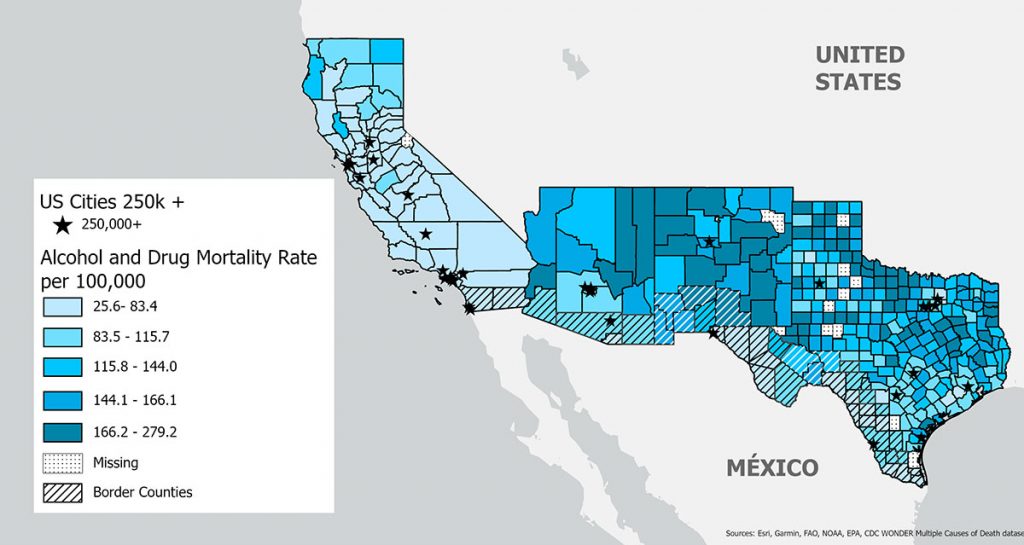Emeryville, CA – People living in US counties on the US-Mexico border are less likely to die of alcohol- and drug-related consequences than people living in off-border counties, according to a new study by researchers at the Alcohol Research Group (ARG), a program of the Public Health Institute. The study is the first to use data from all four US border states to examine whether people living in border counties have higher or lower rates of alcohol- and drug-related mortality compared to people living in interior counties. The results were published today in the Journal of Studies on Alcohol and Drugs.
Researchers found that, compared to people living in counties on the border, people living in off-border counties had significantly higher rates of total mortality from alcohol and drug use as well as alcohol-related mortality and drug-related mortality considered separately: Rates for total mortality, alcohol-related mortality, and drug-related mortality were 28%, 82%, and 30% higher, respectively, off versus on the border. Yet, those living off-border were more likely than those people in border counties to be college-educated and to live in urban areas, both of which were related to reduced alcohol and drug mortality risk.
The study used mortality data from the 2008-2017 Centers for Disease Control and Prevention WONDER Multiple Causes of Death dataset. Data from California, Arizona, New Mexico, and Texas were included in the analysis. Counties were designated as border counties if they fell within the US-Mexico border region, defined in the La Paz agreement as the area within 100 kilometers north and south of the international border.
“People think of border communities as places where crime is rampant, drug trafficking is common, and alcohol and drugs are easy to obtain. These ideas have informed the current federal enforcement practices that designate almost all border communities as high intensity drug trafficking areas. However, what we are finding is that deaths related to alcohol and drugs are actually lower, not higher, in border communities,” said Sarah E. Zemore, study author and senior scientist at ARG.
“Interestingly, these findings are consistent with other research suggesting that greater proximity to the border is related to a longer lifespan. While we don’t yet know what is driving this pattern, it may be that norms and practices common in border communities are especially supportive of a healthy lifestyle. Border communities are heavily immigrant communities, and Latinx immigrants tend to have healthier habits than US-born Americans with regard to alcohol, drugs, and diet. Perhaps immigrant cultures are a positive influence on health in the border region.”
Results point to the need for further research to determine the causal factors that contribute to these differences and for accessible substance use treatment services in areas both on and off the border, to ensure people receive appropriate and effective support.
The study “Alcohol- and Drug-Related Mortality Among Adults Within and Outside the U.S.-Mexico Border Region” by Sarah E. Zemore, Libo Li, Kara Bensley, Katherine J. Karriker-Jaffe, and Cheryl Cherpitel is available online.
__
Support for this paper was provided by the National Institute on Alcohol Abuse and Alcoholism at the National Institutes of Health under award number P50AA005595 (Kerr, PI). The content is solely the responsibility of the authors and does not necessarily represent the official views of the National Institutes of Health.






